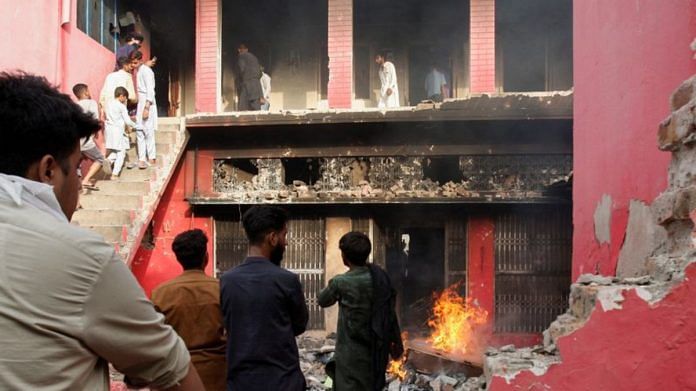“PITY the Nation”, a Supreme Court justice once quoted from Kahlil Gibran’s The Garden of the Prophet in his note added to the judgement, as he concurred with six other colleagues to convict for contempt and, eventually, send home an elected prime minister.
He had refused to write a letter, exposing the president to prosecution in a foreign country, because the country’s chief executive believed that the head of state was guaranteed immunity from prosecution while in office by the Constitution. The court did not agree and convicted the prime minister of contempt.
What the Constitution says has often been found secondary to how the powerful, at any given point, have interpreted it. Another elected prime minister was disqualified from holding office, as he had not declared an un-received potential income; yet another was sent to the gallows in the most outrageous of travesties.
Also read: Pakistani police arrest two Christians accused of blasphemy, days after mob burnt churches
There is no point in recalling how many times the Constitution has been interpreted to accommodate a usurper, since it was first adopted in 1973. The judiciary was seen to not only interpret the document considered sacrosanct as per the will of those guilty of the grossest violations but also grant them the right to amend it.
Well, while some of these transgressions by the guardians of the sacred document can only be worthy of criticism, these should not shock or even surprise you. You needn’t ask why.
The words of the founding father of Pakistan, Mohammad Ali Jinnah, have been treated with similar ‘reverence’. Who wouldn’t remember his address to the officers at the Command and Staff College, Quetta, laying down the principle of upholding civilian supremacy and spelling out the role of institutions and their personnel in subservience to this, as forcefully-articulated in their oaths of office? It was digressions from this role, as envisaged by the father of the nation that ended up shredding the other principle Mr Jinnah enunciated in his speech before the constituent assembly in 1947: “You are free; you are free to go to your temples. You are free to go to your mosques or to any other places of worship in this state of Pakistan. You may belong to any religion, caste or creed — that has nothing to do with the business of the state.”
Jaranwala is just one example where the seemingly insane rage of a paradoxically fairly well-organised mob ran amok in an orgy of violence against defenceless poor Christians; in its wake, it left 19 churches desecrated and many copies of the Holy Bible gutted and nearly 100 homes damaged or destroyed besides widespread looting. Of course, what followed was many decent yet powerless Pakistanis taking to social media with messages of solidarity such as “We hang our heads in shame”.
What even the most compassionate compatriot was hard-pressed to say to the targeted community was that they will be compensated for their losses right away, without the usual bureaucratic hassles, and that there will never be a repeat of such an atrocity. (In the past such violence has also been attributed to the lust for real estate owned by the victims.) Nobody could offer this assurance because deep down each one of us knows that the next such outrage is just months, if not weeks, away as none of the underlying factors will ever be addressed. Our reality is what you see on the faces of each of the 20 million children who are out of school.
Also read: Mob torches churches in eastern Pakistan, paramilitary troops cordon off Christian settlement
It is what you see in the battered, and in one case dead, bodies of Fatima and Rizwana. Dr Zeba Sathar, the eminent population expert and demographer, spoke for so many of us when she wrote in yesterday’s edition of this paper: “Women and girls suffer the most. They have no hopes or dreams — not because they cannot but because our society has already decided their fate, depriving them of their rights.” I’d add the minorities to women and girls.
Steeped in poverty, the poor send their children to work as domestic help or enrol them in madressahs not because they wish their children battered and abused but because they can’t afford to feed them. Just look at this fact against the backdrop of the over one trillion-rupee subsidies and nearly tax-free sectors such as real estate. In industry, the subsidies are pocketed and not used to modernise and expand capacity. If you find me incoherent, pardon me. Seething in helpless anger, overcome by despair, how could anyone be focused? I leave you with Gibran’s ‘Pity the Nation’.
“Pity the nation that is full of beliefs and empty of religion.
“Pity the nation that wears a cloth it does not weave, eats a bread it does not harvest… .
“Pity the nation that acclaims the bully as hero, and that deems the glittering conqueror bountiful.
“Pity the nation that despises a passion in its dream, yet submits in its awakening.
“Pity a nation that raises not its voice save when it walks in a funeral, boasts not except among its ruins, and will rebel not save when its neck is laid between the sword and the block.
“Pity the nation whose statesman is a fox, whose philosopher is a juggler, and whose art is the art of patching and mimicking.
“Pity the nation that welcomes its new ruler with trumpetings, and farewells him with hooting, only to welcome another with trumpetings again.
“Pity the nation whose sages are dumb with years and whose strong men are yet in the cradle.
“Pity the nation divided into fragments, each fragment deeming itself a nation.”
The writer is a former editor of Dawn.
This article was originally published in Dawn’s website.



